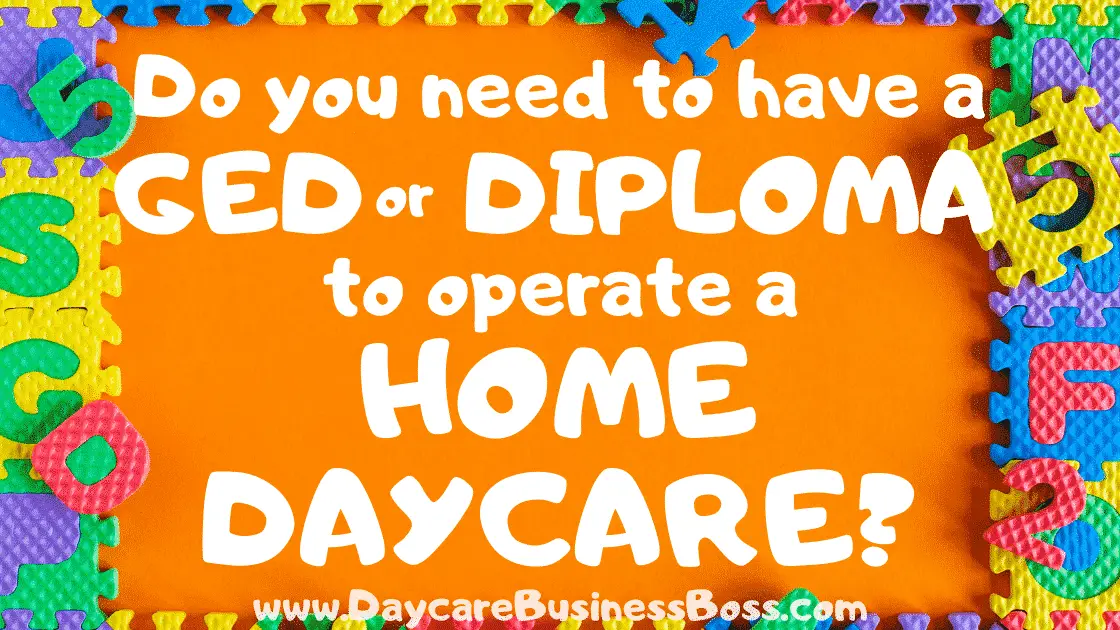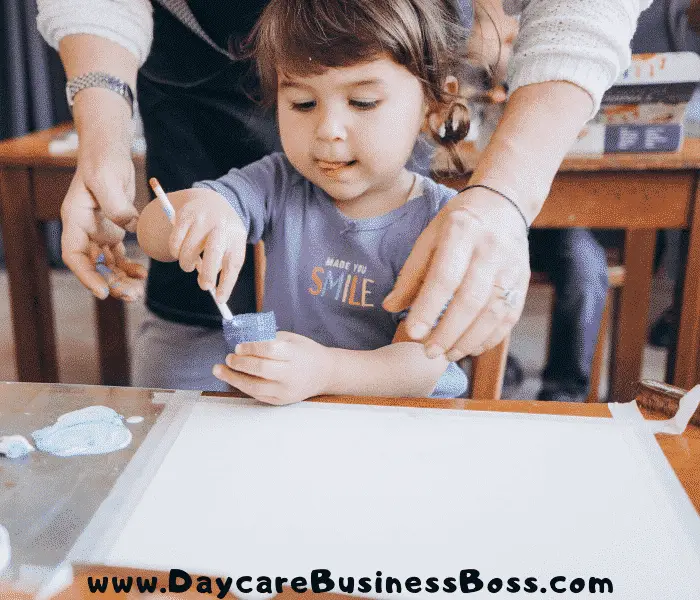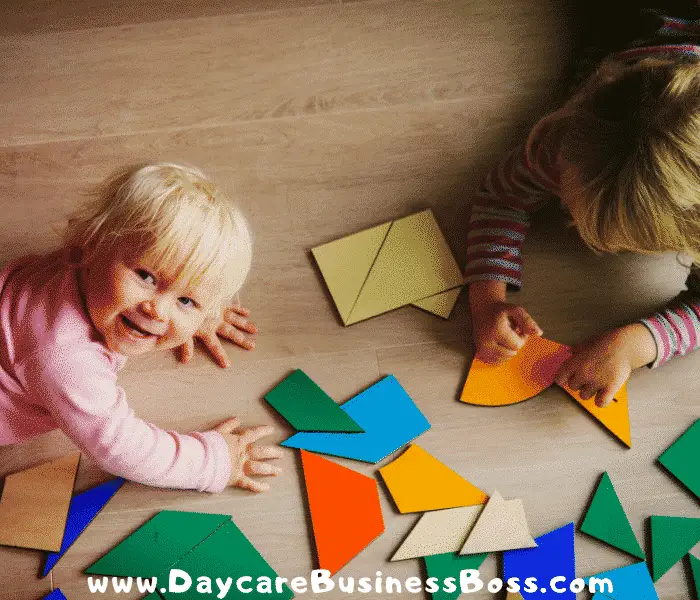Operating a daycare can be a challenging, yet rewarding, undertaking. This is particularly true for home-based daycares, which have slightly different requirements from more traditional childcare facilities. The laws, education, and certification requirements vary by state but are generally similar across the board. Those who would like to operate a home-based daycare must adhere to state regulations and child care laws, attend orientations and certification programs, and submit to background checks and home inspections.
In order to operate a home-based daycare, many states require a GED or high school diploma by law. Those who are interested in operating a home-based daycare may also choose to pursue a higher education degree, such as an associate’s or bachelor’s degree. To find state-specific information, one should consult the National Database of Child Care Licensing Regulations, which compiles the licensing regulations from each state.
Home Based Daycares
There are some key differences between commercial daycare facilities and home-based child care. A great way to get started in the industry (and determine which type of business is best) is to begin by babysitting the maximum number of children before a license is necessary. This would involve supervising a smaller number of children and likely providing services on demand rather than on a set schedule. If one still enjoys the job after about six months to a year, then formally starting and growing the business may be the next step. The first part of that process would be obtaining a state license for home-based child care.
A daycare center is a commercial facility that provides care for a larger amount of children than simply babysitting. Services provided by daycares are often on a set schedule, which is typically 6 am to 6 pm with meals and various structured activities throughout the day. A daycare business requires facility licensing and certifications for owners and employees. As a home-based child care provider, one may be able to supervise one or two children without a license but will most likely need a license for additional children. Even if one chooses to babysit a larger amount of kids and needs to obtain a license, it may still be cheaper than opening a daycare business. Rules regarding when a license is required vary by state, so it is important that one checks with state regulations.
Home-based daycare must pass home inspections. It is important that state requirements for environmental safety and cleanliness are met in order to ensure the safety and well-being of children and employees. States may require individuals to childproof the home and repair or replace unsafe appliances. Additionally, owners also have to maintain important emergency equipment, such as smoke alarms, fire extinguishers, and telephones. Homeowners also need to install fences around any swimming pools, hot tubs, or outside play areas. In order to comply with these regulations, child care providers may need to update or modify their homes according to state requirements.
Education Program
A high school diploma or GED is the first step in starting or operating a home-based daycare. There are also some additional education programs that one may choose to pursue, as many who operate daycare facilities also obtain an associate’s or bachelor’s degree. If, while pursuing their diploma, one decides that they may be interested in operating a daycare, there may be courses available to provide students with some preliminary background in the industry.
Completing a child care management program may also be helpful, and covers some of the core course material that would be included in a college degree program. It can help individuals learn the responsibilities of running a daycare facility and meet state requirements in the process. The courses in a program typically cover subjects such as growth and development, family communication, and nutrition. These programs also focus on business management, budgeting, and organization. Many education providers charge under one thousand dollars for this type of program. One offered by the Stratford Career Institute, for example, covers a wide range of topics. This spans from staffing and management to child behavior and program planning. It is an ideal program for those who are interested in starting a home-based daycare but are not able to make the time or financial commitment that comes with attending college. It will provide a sufficient foundation that will enable one to start a home-based daycare, especially in states that do not have a specified minimum education requirement.
Educational qualifications are very important in the child care industry. Operating or being employed in a daycare facility requires a particular set of knowledge and skills that are obtained through degree programs. Some of the courses that may be required include child development, health, safety, nutrition, and leadership and management. Such courses are intended to educate students on the real-world challenges they will likely face while working in the child care industry. It is important to understand child behavior and development, as well as first aid and health information. Courses in business and leadership skills help prepare students for the financial forms, accounting skills, and management techniques necessary to ensure the smooth operation of a daycare.
Operating a Daycare
In order to operate a home-based daycare, one must first obtain the appropriate licenses. This process is relatively similar between states and involves a number of different steps. The licensing agency reviews deed and tax information to confirm homeownership or rental status. If providers plan on moving once approved, the registration agency must be notified. Additionally, if any household members engage in criminal behavior, violate probation, or are being treated for any mental health issues, the agency must be notified. Some states also require providers to earn food handler certification.
There are space requirements that also vary by state. In Florida, for example, rooms occupied by children must maintain room temperatures of 62 to 82 degrees, have 20 square feet of indoor space for each child, and 45 square feet of outdoor fenced-in play space for each child. In addition, facilities must include a designated area for napping, and each staff member must complete a 40-hour child care training session. Some may find that they may not have the necessary start-up funds or space to hold enough children to be profitable. In this case, one could engage in a revenue-sharing plan, in which the daycare owner could partner with community centers, local churches, or local businesses that have larger unused spaces and enough staff.
After completing the relevant licensing requirements, certifications, and inspections, there is a wide variety of factors that are involved in the smooth operation of a home-based daycare. One will likely have to get additional insurance coverage, as homeowner’s insurance will likely not cover liability, accidents, or damage. Depending on the state and whether an individual intends on hiring additional staff, daycare owners may also need to get workers’ compensation and unemployment insurance. Those interested in operating a home-based daycare and opt to hire staff must also consider which positions they wish to create within the business. This may include cooks, teachers, or nurses.
While there are some states that do not specify a minimum education requirement to operate a home-based daycare, obtaining a diploma or GED may be necessary to obtain the appropriate licenses and certifications. Additionally, the knowledge and skills learned through degree or certification programs will assist in the successful operation of a home-based daycare.
Related Questions
Are there opportunities for career advancement in the future?
Yes. If one is interested in starting or directing a larger daycare facility, operating a home-based daycare provides an excellent experience. Although home-based daycare owners are self-employed and typically operate their own programs, there are opportunities to grow the business. One such opportunity would be to apply for a daycare license that a commercial facility would use. With this license, providers can take on more children, and hire assistants to help with the adult/child ratio and allow their child care programs to grow.
What are some tips to enter the child care industry?
Those who operate daycare typically begin as a teaching assistant or child care worker with a high school diploma. Chances of employment are increased if an individual earns a certificate or associate degree in child development, psychology or youth and family human services. The best pay and administrative positions often go to those who hold a bachelor’s degree in human services or psychology. Those who graduate with master’s degrees in human and family services or child development psychology may qualify to administer large corporate daycare centers.
How do I start?
A good tip is to start small. A home-based daycare or babysitting service with less than a handful of children will allow you to quickly determine if it is the right business for you. If you find it enjoyable, then you can scale the business and grow accordingly. The next step is to become a licensed home-based facility and, if growth continues and you are interested in becoming a professional daycare provider, there are many opportunities for advancement.
Please note: This blog post is for educational purposes only and does not constitute legal advice. Please consult a legal expert to address your specific needs.
Take the next step in realizing your dreams of opening a daycare business. Have a look at our free ebook to get started!


Meet Shawn Chun: Entrepreneur and Childcare Business Fan.
I’m a happy individual who happens to be an entrepreneur. I have owned several types of businesses in my life from a coffee shop to an import and export business to an online review business plus a few more and now I create online daycare business resources for those interested in starting new ventures. It’s demanding work but I love it. I do it for those passionate about their business and their goals. That’s why when I meet a childcare business owner, I see myself. I know how hard the struggle is to retain clients, find good employees and keep the business growing all while trying to stay competitive.
That’s why I created Daycare Business Boss: I want to help childcare business owners like you build a thriving business that brings you endless joy and supports your ideal lifestyle.





6 thoughts on “Do You Need to Have a GED or Diploma to Operate a Home-Based Daycare?”
Comments are closed.